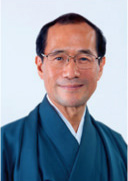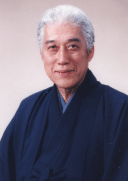What is the Kyoto City International Foundation (KCIF)?
Introduction
What is the Kyoto City International Foundation (KCIF)?
The Kyoto City International Foundation、a public corporation, was founded in order to work towards creating mutually interdependent societies in an atmosphere of respect and regard for other cultures and in the spirit of multiculturalism. Since 2006 the Foundation has managed Kyoto International Community House (kokoka) with the aim of furthering these goals.
Striving to be an organization loved and trusted by the Kyoto community
When we think about what direction that KCIF should go in the future, we strongly feel how much support we have received from organizations and individuals from all walks of life in our community. Every encounter between people brings about a new connection and every conversation expands our network of friends and colleagues. The stronger that we can make that connection, the firmer the relationships between people will become. We are always thinking about how, as a foundation, we can earn the trust, love, and gratitude of the Kyoto community, and in our daily activities we constantly ask ourselves what we can do to reach the goals for which the Foundation was established.
We wish to see a society where
(1)The opinions and thoughts of every individual can be freely expressed.
(2)Everyone can feel connected with the people of the world.
The History of the Foundation
| October 1978 | Kyoto City announced “Declaration of Kyoto as a City Open to the Free Exchange of World Cultures”. |
|---|---|
| January 1989 | Kyoto City International Foundation established. |
| September 1989 | Kyoto International Community House opened. |
| November 1999 | On the 10th anniversary of the Foundation, the concept of working toward “creating mutually interdependent societies in an atmosphere of respect and regard for other cultures and in the spirit of multiculturalism” was established. |
| May 2003 | Korean Salon “Meari” established. |
| May 2003 | “International Community House Festival” held. |
| September 2003 | “Medical Interpreter and Dispatching Service” begun. |
| October 2004 | “Program for Inter Cultural Nexus in Kyoto” begun. |
| November 2004 | First Kyoto International Community House OPEN DAY held. It has been held annualyl since then. |
| April 2006 | The Foundation begins the management of Kyoto International Community House |
| Octorber 2007 | “Interpretation and Counseling Service for Non-Japanese” begun. |
| September 2009 | On the 20th anniversary of the Foundation, “kokoka” selected by the people and adopted as the abbreviation for the Community House. “Resolution for 20-year olds/10 Year Plan” announced |
| May 2010 | The number of visitors to Kyoto International Community House surpassed 5 million. |
| April 2012 | In accordance with the change to the public corporation law, the name of the Foundation was changed to Kyoto City International Foundation |
| February 2014 | “kokoka” formally registered as the abbreviation for the Community House |
| September 2014 | Symposium held to commemorate the 25th anniversary of the Foundation. The total number of kokoka volunteers exceeded 10 thousands. |
| December 2015 | Raised funding for reform "Sister City Exhibition Room" by crowd funding and reached the target amount. |
| March 2016 | Renew the exhibition room, and had an exhibition to celebrate the success of fund-raising. | May 2017 | Organizing the Exhibition of Picture Books of Historical Cities Linked to Kyoto. |
| September 2017 | 10th anniversary of starting the interpretation and consultation service to help the foreign citizens of Kyoto with their administrative procedures. |
| October 2018 | 60th anniversary of the Friendship Agreement between Kyoto and Paris – organizing a poster exhibition. |
| December 2018 | Community interpretation human resources development – making a DVD on maternal and child health interpretation. |
| March 2019 | Holding the 30th Anniversary Symposium “The Age of Multicultural Lifestyle – What can we do here and now?”– Kyoto International Community House 30th Anniversary Project. | September 2019 | Organizing event for the 30th anniversary of the establishment of kokoka “Kyoto is Diversity - The New Age of Multicultural Lifestyle” – Creating the message of the 30-year-old kokoka. |
Symbol and Character
Symbol

Purple, the color associated with royalty… The official color of Kyoto is purple, and the symbol of the Foundation uses this color in a circular pattern with lines stretching outward expressing our wish to expand the role of Kyoto in international exchange. The dot in the middle at the end of each line is the expression of “i”, the first letter in “international”.
Character

“kokoka” is the abbreviation for Kyoto International Community House, taken from the Japanese “KOkusai KOryu KAikan”and it was chosen by the people of Kyoto on the 20th anniversary of the Foundation. On the 25th anniversary of the Foundation, “kokoka”, the logo, and the character all became registered trademarks of the Foundation.
Greetings
Mayor's Greetings

Mayor of Kyoto City, Koji MATSUI
Kyoto, the ancient capital of Japan for over a thousand years, has fostered a rich culture accepting diverse people from inside and outside of Japan to interact. At present, there are 55,000 foreign nationals, including nearly 14,000 international students, active in various fields such as academia, culture, and industry in Kyoto, and they account for about 4% of the population of the city.
Kyoto City International Foundation offers a wide range of services such as multilingual information and consultation services, Japanese language education, and exchange activities to develop cross-cultural understanding, based in the kokoka Kyoto International Community House, which opened in 1989.
The Foundation has played an important role as a key organization in promoting international exchange and harmony in multicultural context in Kyoto, together with many volunteers who cooperate with the management. In prospect of further globalization, the Foundation is required to play a more significant role.
The City of Kyoto shall make Kyoto an outstanding global city, receiving assistance from those who are engaged in international exchange. I hope that Kyoto will be a place where multi-talented people gather and anyone can get excited while cherishing culture and tradition inherited from our predecessors. Your continued support and cooperation will be highly appreciated.
President's Greetings

President of KCIF Genshitsu SEN
The Kyoto City International Foundation was founded in January 1989, and in September of the same year it made the Kyoto International Community House its base from which to
promote activities at the "citizen's level". During this time, information provision activities, support activities for overseas students, internationalizing activities for the
youth who will carry the next century, overseas experience activities and so on have been carried out, but this time information provision activities by the Internet havebeen
started. As to the Internet, in the recent years a part of it has been noticed as some kind of a trend.
However, if the substance of Internet is the ability of "individuals" around the world who sit in front of their computers to exchange information with "individuals" around the
world exceedingly "equally" and "directly", then we may flatter ourselves that it may have a large bearing to this Foundation's aim which is to promote "international exchange
at citizen's level". From now on, by increasing the provided information in both quality and quantity, also by responding to provided information adequately, we will try to promote
the true aim of this Foundation, so as to yourselves we hope that you will continue to support and cooperate as you have until now.
Charter
The technological innovations of recent decades have given us a world where we are getting closer and closer, with speedy transportation and seamless world-wide instant communications.
In this modern world, it is necessary to have a global perspective when we seek to improve our lives and welfare. As we have now held a place as an economically developed nation for most
of our lives, our role in the international community has increased, and the realization of a Japanese society truly open to the world is more important than ever. To deepen mutual understanding
and achieve effective goodwill relations betweens peoples, it is necessary to have cooperation and exchange not only at the national level, but also development of international exchange at
various levels such as cities to cities, and citizens to citizens. In particular, internationalization through cultural exchange on a personal level can encourage citizens to open their minds
to the world and even contribute to world peace. Kyoto was established as Heiankyo more than a thousand years ago, and is proud to be recognized by the international community as the finest
representation of Japanese traditions to the world. Every year millions of visitors from around the globe, including state guests, businessmen, tourists, and international students, come to
Kyoto to experience the essence of Japanese culture. In the decades since Kyoto City’s "Declaration of Kyoto as a City Open to the Free Exchange of World Cultures" in 1978, great strides have
been made with the aim of making Kyoto into a new international city where the cultures of the world can meet and draw strength and vitality from one another. We at Kyoto City International
Foundation, at our home in Kyoto International Community House, now in the 21st century will continue to promote our mission of creating mutual understanding and friendship with international
visitors and residents with various international exchange projects in Kyoto, and in this way contribute to the continuing development of Kyoto as an open, welcoming, cultural city of the world.
Declaration of Kyoto as a City Open to the Free Exchange of World Cultures
Any city is in need of some ideal. When the ideal is based upon an accurate evaluation of conditions in the world and upon a deep reflection on its proper traditions, and if the citizens endeavour
to realize that ideal, then that city can be expected to play an important role in the historical development of the world. In this spirit we have decided to declare the city of Kyoto to be a culturally
free city, open to the exchange of the cultures of the world.
A free city for international cultural exchange is one where peoples of any country may assemble freely and in peace, regardless of race, creed or social system, for the purpose of cultural exchange.
Kyoto is an ancient city which has preserved old cultural heritages and scenic natural beauty for over one thousand years. We cannot, however, merely take pride in past glories, nor live isolated. We must
communicate widely with the world, and through international exchanges Kyoto must be always renewed culturally and continue to create her own unique culture. It is our hope, therefore, to make Kyoto a center
of international cultural exchange.
A declaration of ideals is, of course, much easier than its execution, but we, the citizens of Kyoto, would like calmly to make this resolution and pledge our efforts towards what we can do for the realization
of this ideal.
Octorber 15, 1978 Kyoto City
